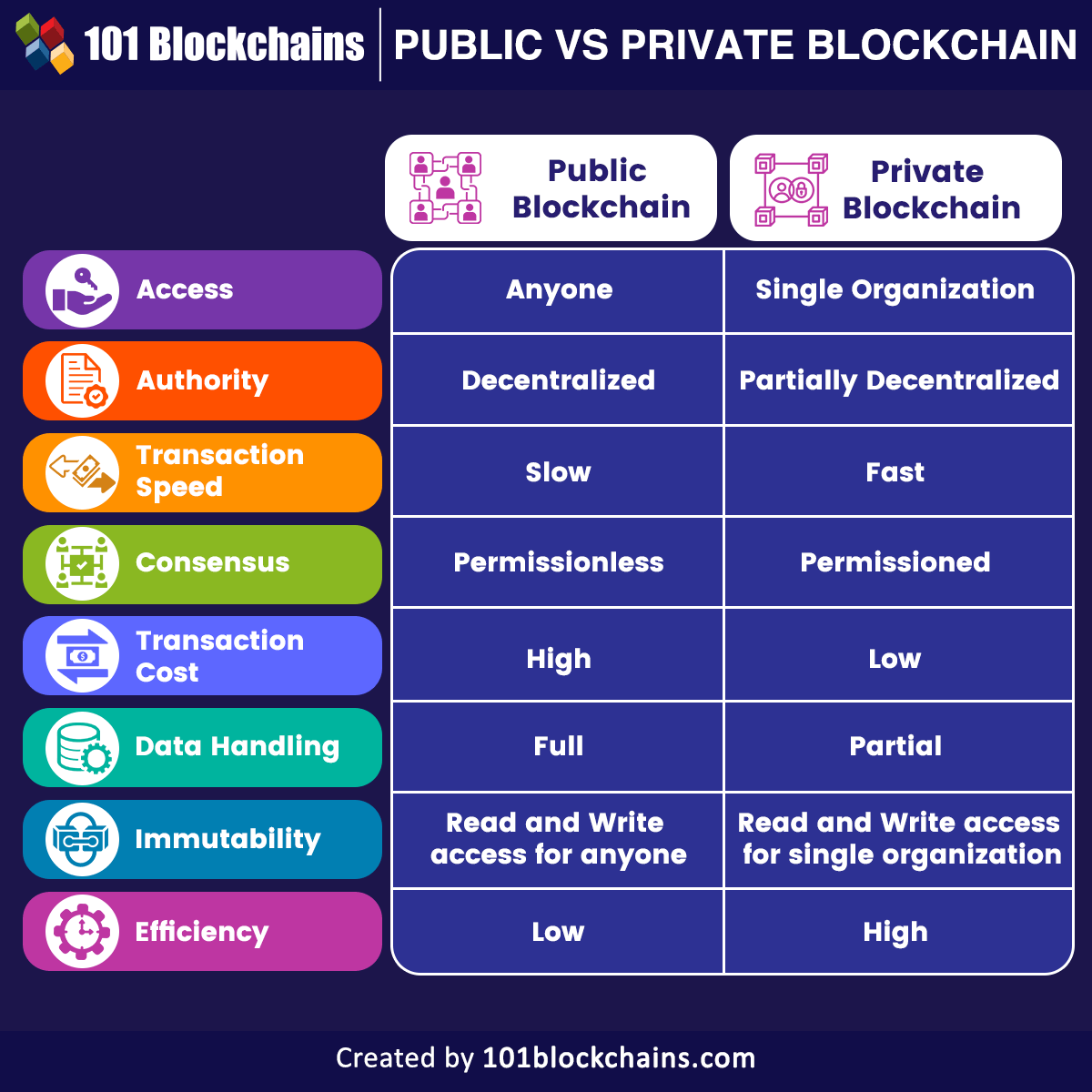Learn how blockchain truly works, master key definitions, and uncover what makes smart contracts so "smart." Dive into the fundamentals, gain valuable insights, and start your blockchain journey today!

- Blockchain
Hasib Anwar
- on June 04, 2021
Private vs Public Blockchain: A Direct Comparison
This article offers a quick overview and a comparison between private vs public blockchain in simpler terms.
For someone new to the fundamentals of blockchain technology, it’s imperative to understand the basic difference between the two categories of blockchain. This classification is based on the level of permission a user gets when joining a particular blockchain.
Both the private and public blockchain come with different sets of advantages and disadvantages. It’s up to the user which of the blockchain type suits their particular needs and use cases.
This article will only focus on offering a brief comparison between private vs public blockchain. For a detailed overview, one should go through the detailed guides suggested throughout the article.
What Are Private Blockchains? A Quick Overview
A private blockchain is the type of blockchain network where a single organization holds complete authority over who can join the network, access the nodes, and participate in the consensus algorithm. In short, the controlling organization has total control over the network. Due to this nature, a private blockchain is also known as a permissioned blockchain.
You might think that this type of blockchain goes against the fundamentals of blockchain technology. However, the network is based on a distributed ledger and the users with permission have full access to the nodes.
Higher efficiency, better scalability, and robust security are some of the strongest appeals of the private blockchain.
Notable Features of Private Blockchains
- Higher Efficiency — Due to the strict control from the authoritative organization, private blockchains have better resource utilization, thus ensuring higher efficiency. Also, it’s one of the biggest drivers for private blockchain use cases.
- Privacy — Private blockchains inherently focus on privacy and data security.
- Enterprise-Centric — As privacy and security are imperative for enterprises, private blockchains are better suited to tend to the needs of these organizations. Private blockchains enable the enterprises to safer internal ecosystems and function as a whole.
- Stability — Due to the lower number of users and transactions, private blockchains have superior stability over public blockchains.
- Low Transaction Fees — Private blockchains offer lower transaction fees due to the lower number of transaction requests.
- Safety — Due to the entry-barrier, unwanted intruders can’t access the network. It ensures better safety and a safeguard against any illegal activities.
- Better Regulation — The authoritative organization can easily outline the rules and apply regulatory steps to imply the rules.
Read More: What is a Private Blockchain?
What is a Public Blockchain? A Quick Overview
A public blockchain is a type of blockchain network that doesn’t have any restriction over the level of permission. Anyone can join the network, access the nodes, and participate in mining and consensus algorithm.
Public blockchains are fully decentralized, permissionless, and completely immutable — adhering to the fundamental features of first-gen blockchain networks.
Notable Features of Public Blockchains
- Truly Decentralized — A public blockchain doesn’t have any regulatory body — making it truly decentralized and distributed.
- Complete Transparency — Public blockchains are inherently transparent where has access to the ledger and participate in consensus.
- Immutable — When a block enters the chain, there is no way to alter or delete the block. It means the network is completely immutable.
- User Empowerment — A user of a public blockchain doesn’t have to adhere to any rules or regulation from a third-party, apart from the legacy rules of the network itself.
Read More: What is a Public Blockchain?
Private vs Public Blockchain: A Detailed Comparison
You might be looking for a blockchain network that is superior to all others. But that’s not possible as every type of blockchain network has some advantages and disadvantages. As a result, they all have suitable use cases.
For example, public blockchains are perfect for cryptocurrencies. Popular cryptocurrencies like — Bitcoin, Ethereum, Litecoin — are ideal public blockchain examples.
On the other hand, private blockchains are perfect at catering to the needs of enterprises. Large corporations like IBM, Microsoft, Alibaba — are great private blockchain examples. If you take a look at the top companies using blockchain technology, you’ll see that almost all of them prefer private blockchains over the others.
Hyperledger, R3 Corda, Enterprise Ethereum, Quorum, Ripple — are some of the well-known private blockchain platforms.
So, you see the choice is dependent on the blockchain business strategy and a particular company’s mission and vision.
Still, if you want a direct comparison, the following table should help you get an idea —

Final Thoughts
As you can see, there are a lot of differences in both of the technologies. In reality, both public and private blockchain is suitable for enterprises’ environments if you can take the features you want. Apart from these two basic types, there are other types of blockchain — i.e., hybrid and federated or consortium blockchain.
But in the end, the decision is entirely up to you. Hopefully, this guide will help you out in choosing the perfect one for your business.
But if you want to get into more details, then make sure to check out our free blockchain course to learn more about it.






